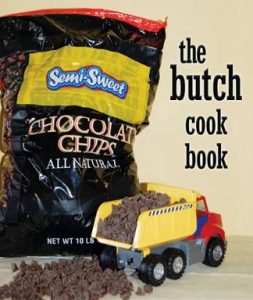 You know you’re not a femme when all you do before you leave the house is change your shoes, grab your vest and give the dog a treat. Okay, maybe you put on your baseball cap, but you already know whether it’s an Ace Hardware or Yankees or Xena hat day.
You know you’re not a femme when all you do before you leave the house is change your shoes, grab your vest and give the dog a treat. Okay, maybe you put on your baseball cap, but you already know whether it’s an Ace Hardware or Yankees or Xena hat day.
What with the Butch Cook Book due out this summer, I have a feeling we’re going to be asked for some definitions of butch pretty frequently. “We” being the editors, contributors, girlfriends, booksellers and anyone else in the vicinity of the book. The Pianist and the Handy Dyke and I had innumerable discussions, short and long, while driving or testing recipes or walking on the beach or sitting on the deck — and never came to any conclusions.
There is no definition, of course. Try as we might, no one with whom I have discussed the subject has been able to explain with certainty what makes a butch a butch or a femme a femme. Except one of the contributors to the Butch Cook Book, Frenchy Tonneau, a woman who personifies the arrogance associated with much of butchdom. She once commented, when I told her about a diatribe I’d read that criticized the concept of femme and butch, “Why doesn’t she go back to men if she’s so scared of real dykes?”
Frenchy has become a bit sore about the way her own people sometimes belittle her because she is proudly butch. Yet even she can’t give a list of qualities associated with the lesbian genders. I called her recently and she tried again. “You’re a butch if you’re attracted to femmes. Except wait, even I fell for another butch once. And what if a femme falls for a woman who looks butch, but thinks of herself as femme? The other thing is,” she went on, “how you act in bed. Like, who starts things. It’s always the –“ she paused. “Let’s not even go there.” She was more confident when she said, “And it sure as hell isn’t who does the cooking. My spaghetti can’t be beat. Unless you mind the burnt stuff on the bottom of the pan.”
My friend the pixie, who self-identifies as a femme, wrote me: “I can tell a butch because I never get twitterpated with femmes.”
My sweetheart and I stumbled on yet another theory one day when, she, in the South, and I, in the Northwest, were on the phone. We both needed to run out to our local supermarkets, but couldn’t bear to part. We hung up, planning to reconnect when we got home. I drove to the far side of town to find a long list of items, returned some library books, chose some others and stopped at the post office to wait in line, cursing at the delay. I wanted to get home and talk to my sweetheart forthwith! Back at the house, I donned my Bluetooth earpiece and, not to lose any time, used voice command to connect with her.
She was just getting in her car.
I didn’t say a word, I swear. She sounded appealingly, coyly, sheepish when she explained her ritual. Before leaving, she’d had to change into an unwrinkled t-shirt. Her long hair needed brushing and a hair band. She’d applied a moisturizing lipstick. Of course she needed sunglasses in the South, but first she had to hunt them down. Her nail polish had chips so she repaired those. She found her purse (I didn’t ask where) and then got some gum to put in it. Finally – almost — my sweetheart got the garbage ready and put a new bag in the can, replaced the CDs she’d taken from her car and made her bed. This was all done possibly, but not necessarily, in that order. When, back home, I called, she was leaving for the dumpster and then the store.
I couldn’t stop laughing. Neither could she. We had found the key to identifying the difference between butch and femme: how long it takes a femme to venture out into the world!
Then I remembered another relationship, another femme, and how frustrated she’d get while waiting for me to get ready to leave the house. Maybe she wasn’t really a femme? Maybe I’m not really a butch?
Lee Lynch wrote the classic novels The Swashbuckler and Toothpick House. Her new novel, Rainbow Gap, is now available at women’s and gay bookstores and at boldstrokesbooks.com. Most recently she was made namesake and first recipient of the Golden Crown Literary Society Lee Lynch Classic Award for her novel The Swashbuckler. A three time Lammy finalist, she is also a recipient of the James Duggins Mid-Career Award in Writing and many more honors.











